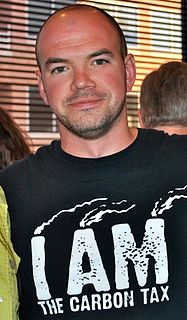A Quote by Alex Steffen
For carbon-neutral cities, there are things worth talking about in how our consumption patterns can change - sharing goods, etc. - but those are a fraction of the impacts of transportation and building energy use. If we need to choose priority actions, the most important things are to densify, provide transit, and green the buildings.
Quote Topics
About
Actions
Building
Buildings
Carbon
Change
Choose
Cities
Consumption
Energy
Energy Use
Etc
Fraction
Goods
Green
How
Impacts
Important
Important Thing
Important Things
Most
Most Important Thing
Need
Neutral
Our
Patterns
Priority
Provide
Sharing
Talking
The Most Important
Things
Those
Transit
Transportation
Use
Worth
Related Quotes
I think green buildings are extremely important but it's only part of the equation. A lot of people think that if I put a green building everything is going to be fine, but actually it's not just the green buildings we need, but green businesses, green governments, green economics. We have to extend the greening of buildings to our business and our lifestyles - that is the most important thing to do next.
My first goal would be to reduce the perturbation in the carbon cycle. That would mean using carbon neutral sources of energy, and changing our agricultural practices to be less disruptive and polluting. I'm not talking about a policy here so much as changing the way our infrastructure works. That's why I'm so fascinated with changing the way we build cities, because they are the most developed forms of physical infrastructure for human habitation.
When I'm talking about a developing world, I also look at clean-water access - women who are more vulnerable to sexual violence when they're fetching water. And talking about what we have going on here, with our carbon footprints and our emissions, is just as important to me as figuring out how to provide clean water to people who need it in regions around the world.
The language that we use now impacts on the ability to vote, it impacts on the marketplace; instead of making things clear, it makes it more confusing. I think we need to stop using neutral language and speak in straighter terms. So when you agree to something, you actually get what you agreed to in the first place.
Building places that are worth living in and worth caring about require a certain attention to detail, and of a particular kind of detail that we have forgotten how to design and assemble. And that involves the relationship of the buildings to each other, the relationship of the buildings to the public space, which in America, comes mostly in the form of the street. Because it's only the exceptional places in America that have the village square or the New England green. You know. The street is mostly the public realm of America. And we have to design these things so that they reward us.
As the world's "most dynamic" cities seek to manage their own urban growth, American state and local officials have much to offer. Our mayors can share their experiences in urban design, clean energy projects, Smart Grids, codes for energy efficient buildings, transportation safety, and innovative environmental solutions.
Excess consumption doesn't make people happy. We can continue to provide for our needs, but we can't continue the endless pursuit of ever more consumer goods. There is no energy source that can provide enough consumer goods to meet our human and emotional needs; there never has been, and that's why it's been such a fruitless pursuit.
Developed and benefited from the unsustainable patterns of production and consumption which have produced our present dilemma. It is clear that current lifestyles and consumption patterns of the affluent middle class-involving high meat intake, consumption of large amounts of frozen and convenience foods, use of fossil fuels, appliances, home and work-place air-conditioning, and suburban housing-are not sustainable. A shift is necessary toward lifestyles less geared to environmentally damaging consumption patterns.




































